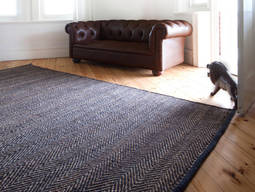Buying sustainably and how to do it effectively

Buying environmentally friendly items can be hard to spot without asking a million questions, and although these types of questions are always welcome it’s nice to have some knowledge before hitting the shops.
Let’s look at some of the criteria to spot an eco-friendly choice.
Renewable
When we say renewable, this means that the resource is replenished greater than its rate of depletion. A great example of this is hemp and cane, both which are grown without pesticides and using very little water. Cane (or rattan) is fast-growing resource that requires little to no assistance while actually adding value to the land; thus protecting the forests in which it grows.
Non-toxic materials
So many things we buy for around the home have hazardous components to them. Furniture for the most part runs a great risk of being sprayed with chemicals at the start of their cycle (herbicides, pesticides), chemicals during the manufacture (PCP’s etc) and finished off with polyurethane coatings, scotch-guarding and so many other toxins. When shopping for wooden pieces look for items with a natural beeswax finish or a water-based varnish. If looking for upholstered pieces choose fabrics like linen, hemp or bamboo. Cotton isn’t the best choice but if you find Certified Organic this is a-ok!
Recyclable materials
Natural materials are not only beautiful; they are highly renewable and recyclable. Glass and ceramics are perfect examples of this - and if you find pieces which are handmade, you are supporting artisans instead of machines so hooray for you!
Fair trade
FINE aptly defines this as “a trading partnership, based on dialogue, transparency and respect, that seeks greater equity in international trade". It contributes to sustainable development by offering better trading conditions to, and securing the rights of, marginalized producers and workers. Fair Trade organizations, backed by consumers, are engaged actively in supporting producers, awareness raising and in campaigning for changes in the rules and practice of conventional international trade”.
Long story short – if you see ‘Fair Trade’ announced on anything taking your fancy, you are making a great (and mindful) choice to support artisans and craftsmen.
- Contemporary Furniture in Australia
- Contemporary Furniture in Adelaide
- Contemporary Furniture in Brisbane
- Contemporary Furniture in Inner North
- Contemporary Furniture in Hobart & South East
- Contemporary Furniture in Melbourne
- Contemporary Furniture in Darwin
- Contemporary Furniture in Sydney
- Contemporary Furniture in Perth


